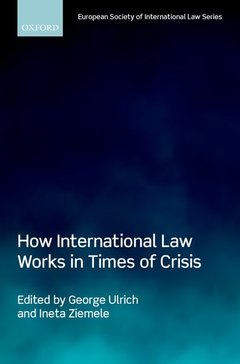How International Law Works in Times of Crisis European Society of International Law Series
Langue : Anglais
Coordonnateurs : Ulrich George, Ziemele Ineta

For some time, the word 'crisis' has been dominating international political discourse. But this is nothing new. Crisis has always been part of the discipline of international law. History indeed shows that international law has developed through reacting to previous experiences of crisis, reflecting an agreement on what it takes to avoid their repetition. However, human society evolves and challenges existing rules, structures, and agreements. International law is confronted with questions as to the suitability of the existing legal framework for new stages of development. Ulrich and Ziemele here bring together an expert group of scholars to address the question of how international law confronts crises today in terms of legal thought, rule-making, and rule-application. The editors have characterized international law and crisis discourse as one of a dialectical nature, and have grouped the articles contained in the volume under four main themes: security, immunities, sustainable development, and philosophical perspectives. Each theme pertains to an area of international law which at the present moment in time is subject to notable challenges and confrontations from developments in human society. The surprising general conclusion which emerges is that, by and large, the international legal system contains concepts, principles, rules, mechanisms and formats for addressing the various developments that may prima facie seem to challenge these very same elements of the system. Their use, however, requires informed policy decisions.
George Ulrich is currently Professor of Human Rights at the Riga Graduate School of Law and Programme Director of the European Master's Degree in Human Rights and Democratisation (EMA). He served as Rector at the Riga Graduate School of Law from 2009-2016 and as Secretary General of the European Inter-University Centre for Human Rights and Democratisation (EIUC) from 2003-2009. With a PhD in Philosophy from the University of Toronto, he has published extensively on topics related to the philosophy and practical implementation of human rights in an interdisciplinary perspective as well as on issues related to medical ethics, professional ethics, and the ethics of human rights. Ineta Ziemele is Professor at the Riga Graduate School of Law. She has been Judge at the Constitutional Court of Latvia since January 8, 2015, and President of the Constitutional Court of Latvia since May 8, 2017. Professor Ziemele is a former Judge of the European Court of Human Rights (2005-2014) and President of the Court Chamber (2012-2014). She is Editor-in-Chief of the Yearbook of Baltic International Law and Corresponding Member of the Latvian Academy of Science. She was awarded a doctoral degree in law from Cambridge University in 1999.
Date de parution : 10-2019
Ouvrage de 362 p.
16.2x23.9 cm
Thèmes de How International Law Works in Times of Crisis :
© 2024 LAVOISIER S.A.S.



